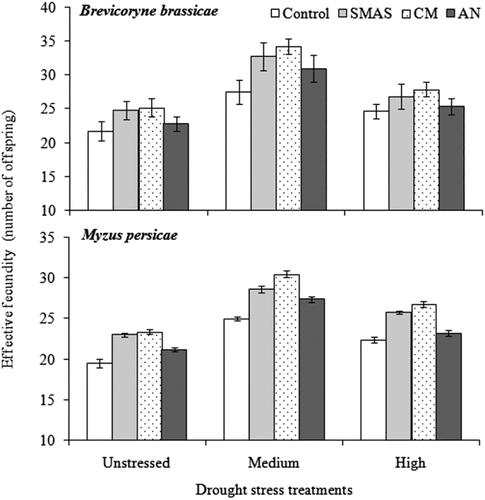当前位置:
X-MOL 学术
›
Ann. Appl. Biol.
›
论文详情
Our official English website, www.x-mol.net, welcomes your
feedback! (Note: you will need to create a separate account there.)
The effects of drought stress and type of fertiliser on generalist and specialist herbivores and their natural enemies
Annals of Applied Biology ( IF 2.2 ) Pub Date : 2020-10-09 , DOI: 10.1111/aab.12654 Muhammad Shehzad 1 , Asim Gulzar 1 , Joanna T. Staley 2 , Muhammad Tariq 1
Annals of Applied Biology ( IF 2.2 ) Pub Date : 2020-10-09 , DOI: 10.1111/aab.12654 Muhammad Shehzad 1 , Asim Gulzar 1 , Joanna T. Staley 2 , Muhammad Tariq 1
Affiliation

|
Abiotic stresses such as drought and nutrient availability can affect invertebrate herbivores feeding on plants, and potentially cascade up to impact their predators and parasitoids. Although these two factors separately been the subject of many studies, there are few tests of their combined effects in the context of pest species and their natural enemies on cultivated plants. Climate change models predict an increase in the frequency and severity of droughts, while the type and amount of fertiliser applied to crops is more under the control of growers. Understanding how these two abiotic factors may interact is key to utilising the potential of natural enemies to control pests under a future climate. To address this, a range of drought and fertiliser type treatments were applied to a model Brassica system in a factorial design, and the performance of two ubiquitous aphid species and their parasitoids was assessed. One aphid species was a specialist on Brassicas (Brevicoryne brassicae, with parasitoid Diaeretiella rapae) and the second a generalist aphid species (Myzus persicae, with parasitoid Aphidius colemani). The performance of both aphid species responded in a similar way to the treatments, and was maximised on plants growing in organic fertilisers under medium levels of drought stress. The strongest effects of drought and fertiliser cascaded up to affect parasitoids. Parasitoid performance responded in a broadly similar way to their aphid host performance in relation to fertiliser type. Some of the smaller effects of fertiliser treatments on aphid performance were not found for parasitoid performance. Aphid performance was greatest on plants under medium drought stress, but the parasitoids only responded consistently to the high drought stress treatment, on which their performance was reduced. Interactions between the drought and fertiliser did not have a large effect on aphid or parasitoid performance, compared with the strong main effects found for each treatment. These results are discussed in the context of previous and future research on the impacts of abiotic stresses on invertebrate herbivores and their natural enemies.
中文翻译:

干旱胁迫和肥料类型对普通和特种草食动物及其天敌的影响
非生物胁迫(例如干旱和营养供应)会影响以植物为食的无脊椎动物食草动物,并有可能级联起来影响其食肉动物和寄生生物。尽管这两个因素分别是许多研究的主题,但很少有关于害虫物种及其天敌对栽培植物的综合影响的试验。气候变化模型预测干旱的频率和严重性会增加,而施用于农作物的肥料的类型和数量则更多地处于种植者的控制之下。了解这两种非生物因素如何相互作用是利用天敌在未来气候下控制害虫的潜力的关键。为了解决这个问题,在因子设计中,将多种干旱和肥料类型的处理方法应用于甘蓝型油菜模型系统,并评估了两种无处不在的蚜虫及其寄生虫的性能。一个蚜虫物种是芸苔属(Brassicas(Brevicoryne芸苔属,有寄生的Diaeretiella rapae),第二种是普通蚜虫(Myzus persicae,寄生有蚜虫Aphidius colemani)。)。两种蚜虫的性能都以与处理相似的方式响应,并且在中等水平的干旱胁迫下,在有机肥料中生长的植物上均发挥了最大作用。干旱和化肥的最强效应叠加影响了寄生虫。相对于化肥类型,拟寄生物的表现与其蚜虫寄主的表现大致相似。没有发现化肥处理对蚜虫性能的一些较小的影响。在中等干旱胁迫下,蚜虫的表现最强,但对高干旱胁迫下的寄生虫反应却始终如一,这会降低其性能。干旱和肥料之间的相互作用对蚜虫或类寄生虫的生长性能没有很大的影响,与每种疗法的强效主要作用相比。这些结果是在先前和未来研究非生物胁迫对无脊椎动物食草动物及其天敌的影响的背景下讨论的。
更新日期:2020-10-09
中文翻译:

干旱胁迫和肥料类型对普通和特种草食动物及其天敌的影响
非生物胁迫(例如干旱和营养供应)会影响以植物为食的无脊椎动物食草动物,并有可能级联起来影响其食肉动物和寄生生物。尽管这两个因素分别是许多研究的主题,但很少有关于害虫物种及其天敌对栽培植物的综合影响的试验。气候变化模型预测干旱的频率和严重性会增加,而施用于农作物的肥料的类型和数量则更多地处于种植者的控制之下。了解这两种非生物因素如何相互作用是利用天敌在未来气候下控制害虫的潜力的关键。为了解决这个问题,在因子设计中,将多种干旱和肥料类型的处理方法应用于甘蓝型油菜模型系统,并评估了两种无处不在的蚜虫及其寄生虫的性能。一个蚜虫物种是芸苔属(Brassicas(Brevicoryne芸苔属,有寄生的Diaeretiella rapae),第二种是普通蚜虫(Myzus persicae,寄生有蚜虫Aphidius colemani)。)。两种蚜虫的性能都以与处理相似的方式响应,并且在中等水平的干旱胁迫下,在有机肥料中生长的植物上均发挥了最大作用。干旱和化肥的最强效应叠加影响了寄生虫。相对于化肥类型,拟寄生物的表现与其蚜虫寄主的表现大致相似。没有发现化肥处理对蚜虫性能的一些较小的影响。在中等干旱胁迫下,蚜虫的表现最强,但对高干旱胁迫下的寄生虫反应却始终如一,这会降低其性能。干旱和肥料之间的相互作用对蚜虫或类寄生虫的生长性能没有很大的影响,与每种疗法的强效主要作用相比。这些结果是在先前和未来研究非生物胁迫对无脊椎动物食草动物及其天敌的影响的背景下讨论的。











































 京公网安备 11010802027423号
京公网安备 11010802027423号